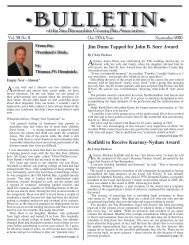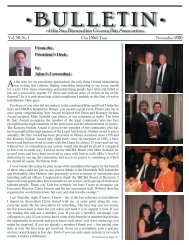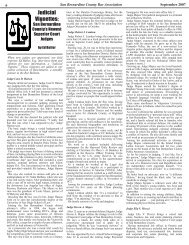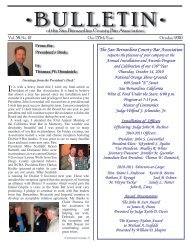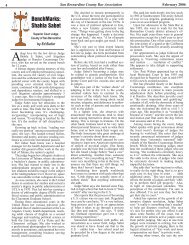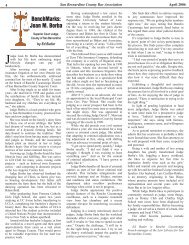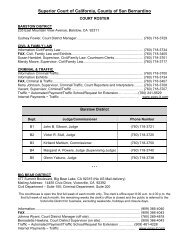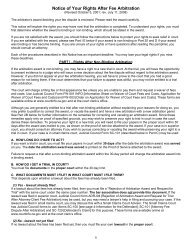April 2009 - San Bernardino County Bar Association
April 2009 - San Bernardino County Bar Association
April 2009 - San Bernardino County Bar Association
- No tags were found...
Create successful ePaper yourself
Turn your PDF publications into a flip-book with our unique Google optimized e-Paper software.
2 <strong>San</strong> <strong>Bernardino</strong> <strong>County</strong> <strong>Bar</strong> <strong>Association</strong> <strong>April</strong> <strong>2009</strong>...President’s Desk (from page 1)our system of justice. I asked several of thejurors, if in fact, they had felt that same waywhen they realized that they had been calledto jury duty. Not one of those 14 individualsstated that they were happy to be called forjury duty. Although after going the entiretrial, many told me that they enjoyed theprecess and they would not mind servingsome time in the future on another jury.I bring this up because in the 29 years thatI have been involved in our justice system, Ihave never served on a jury. In fact, I haveonly been called for jury service on a fewoccasions. One of those occasions occurredrecently. About six weeks ago, I went tomy post office box and there was a juryduty summons directing me to report to the<strong>San</strong> <strong>Bernardino</strong> <strong>County</strong> central courthouselocated at 351 N. Arrowhead Avenue, in <strong>San</strong><strong>Bernardino</strong>. This courthouse is where I doapproximately 75 percent of my work and isabout two blocks from my office. As I thinkback, I realize that even though I know howimportant the role of jurors are in our system,I immediately starting thinking about waysto get out of serving on a jury. I thought“well, I am too busy”, “my clients willsuffer,” “I can’t take the time away from myduties as <strong>Bar</strong> President as well as the othernonprofit boards that I sit on.” Certainly allvalid reasons, much like the reasons of ourjurors in Riverside <strong>County</strong> first had whenthey received their notice to serve.As I drove home with my jury notice, Istarted to think about the long history of juryservice and being the type of guy that likes toresearch issues from a historical perspective,I did some research as to the history of thejury. I learned that by the time the UnitedStates Constitution and the Bill of Rightswere drafted and ratified, the institution oftrial by jury was almost universally revered.I also learned that the history of juries canbe traced back to the time of the MagnaCarta. The jury began in the form of a grandpresentment jury with the role of inquestand was started by the Frankish conquerorsto discover the King’s rights. Henry IIregularized the types of proceedings toestablish royal control over the machineryof justice. It was first done in civil trials thenlater in criminal trials.It was during the 17 th century that the juryemerged as a safe guard for the criminallyaccused. Thus, in the 18 th century Blackstonecould commemorate the institution as part ofa “strong and two-fold barrier between theliberties of the people and the prerogativeof the crown” because “the truth of everyaccusation must be confirmed by theunanimous suffrage of twelve of his equaland neighbors indifferently chosen andsuperior to all suspicion.”The right was guaranteed in the Constitutionof the original thirteen states, was guaranteedin the body of the Constitution and the SixthAmendment; and the Constitution of everystate entering the Union thereafter - in oneform or another - protected the right of jurytrials in criminal cases.Armed with this information, I, along with200 other citizens, reported to the groundfloor jury assembly room at the centralcourthouse on St Patrick’s Day, March 17,<strong>2009</strong>. I noticed that as I walked into the juryassembly room that everyone looked thesame. They were waiting in line to checkin and truthfully it did not look like a lot ofthose folks wanted to be there. As I stoodin line waiting my turn to check in withthe clerk, I could hear conversations amongother potential jurors all saying that theywished they were not there.I turned around and noticed a familiarface - standing behind me was Mike Reiter,a lawyer and fellow board member of theLegal Aid Society of <strong>San</strong> <strong>Bernardino</strong>, whoworks as an Assistant City Attorney for theCity of Redlands. Mike and I started talkingabout the role of jurors and I learned that,like myself, Mike was intrigued about thechance to serve on a jury. After checkingin, Mike and I sat down and I discussed withhim the fact that in 29 years, I had neverbeen picked to serve on a jury. Mike and Iwere eventually given a group designationand we waited to learn as to whether or notwe would be called to serve. As Mike and Istarted to talk about our roles as lawyers insociety, other members of the potential jurypool started to speak to us.Over the course of the next hour and a half,I had conversations with several membersof the potential jury pool in regards to thelaw and the history of jury service. Whilethis was going on, the prospective jurymembers were able to view a professionallymade video of jury service. Ultimately, mygroup was not needed and I was given areceipt documenting that I had come in forjury duty and I would not have to serve fora year. As I left the jury room that day andwalked up to the 4 th floor to meet with anassociate who was working on a matter formy office, I was actually disappointed that Iwould not be sitting in the jury box, listeningto lawyers’ voir dire and questions. As I leftthe courthouse that day, I made a promiseto myself that the next time I go to my postoffice box and I see a jury summons, that Iwon’t think about ways to get out of juryduty, but will in fact calendar it and lookforward to that day. I hope each of you willfeel the same the next time you are called tojury duty.In regards to <strong>Bar</strong> news, there is much to talkabout. After reviewing all the nominationsfor the Kaufman/Campbell Award, the<strong>San</strong> <strong>Bernardino</strong> <strong>County</strong> <strong>Bar</strong> <strong>Association</strong>Board of Directors unanimously voted the<strong>2009</strong> Kaufman/Campbell to the HonorableMargaret Powers, Judge of the SuperiorCourt. Personally, I am very grateful that Ihad the opportunity to notify Judge Powersof her selection for this prestigious award. Ihad first met Margaret Powers in 1981 whileI worked at the Ontario Police Department.Judge Powers is the wife of John Powers,who at the time was a Lieutenant working asa Watch Commander for the graveyard shiftat the Ontario Police Department. LieutenantPowers was one of my first supervisors, adedicated police officer who cared aboutthe citizens that we served as well as themen and women who worked for him. I lookforward to the Kaufman/Campbell Awardand being able to go up and shake the handof my old Lieutenant whom I have not seenin many years.Also I am pleased to announce (see box onpage 7) nominees for the <strong>2009</strong>/2010 Board ofDirectors positions as well as the nomineesfor the executive board. I look forward toworking with each one of the nominees nextyear. It is an extraordinary group of lawyersand human beings who truly understandwhat it means to care about the communityin which we live and work.I look forward to continuing to speak to themembers over the next several months. Yoursuggestions and ideas have been wonderfuland we are working toward implementingmany of them.Until next month, as always work welland care.Local Inn of CourtAnnounces MentoringProgramThe Joseph B. Campbell Inn of Court hasinstituted a mentoring program.The Inns program has a focus whichis distinct from the Mentoring Programrecently initiated by the <strong>San</strong> <strong>Bernardino</strong><strong>Bar</strong> <strong>Association</strong>, said Michael Schaefer,chairman of the proram. Unlike the <strong>Bar</strong><strong>Association</strong> program, the Inns of CourtMentoring Program does not seek to teachspecific practice skills. Instead, the Inns ofCourt program is aimed at broader issues ofcurrent concern to the profession: approachesto ethical and professional issues, careergoals, types of legal practice, law practicemanagement issues and quality of life issues.The goal is to better equip less experiencedlawyers to deal with the realities of thepractice of law and to understand ethics andprofessionalism more fully. Because thesesubjects cut across various legal practiceareas no effort is made to match mentors andmentees by practice area.Each mentee is matched with a singlementor. They are asked to get togetherfor lunch at least twice a month (mentorpays) to talk about issues of concern tothe mentee. Schaefer suggests that at leastone of these lunches be at the monthlyinformal lunch with judges and attorneys atNena’s Restaurant, 642 North D Street, <strong>San</strong><strong>Bernardino</strong>. It is on the second Wednesdayof each month.A Mentor Program Handbook, ProgramGuidelines and Acknowledgement, and awelcome letter can be accessed through theFullerton, Lemann, Schaefer & DominickLLP website www.flsd.com. Lawyers whowould like to participate as either mentors ormentees should contact Michael Schaefer oremail him at mschaefer@flsd.com.Please note that all mentors and menteesmust be members of the Inns of Court.



